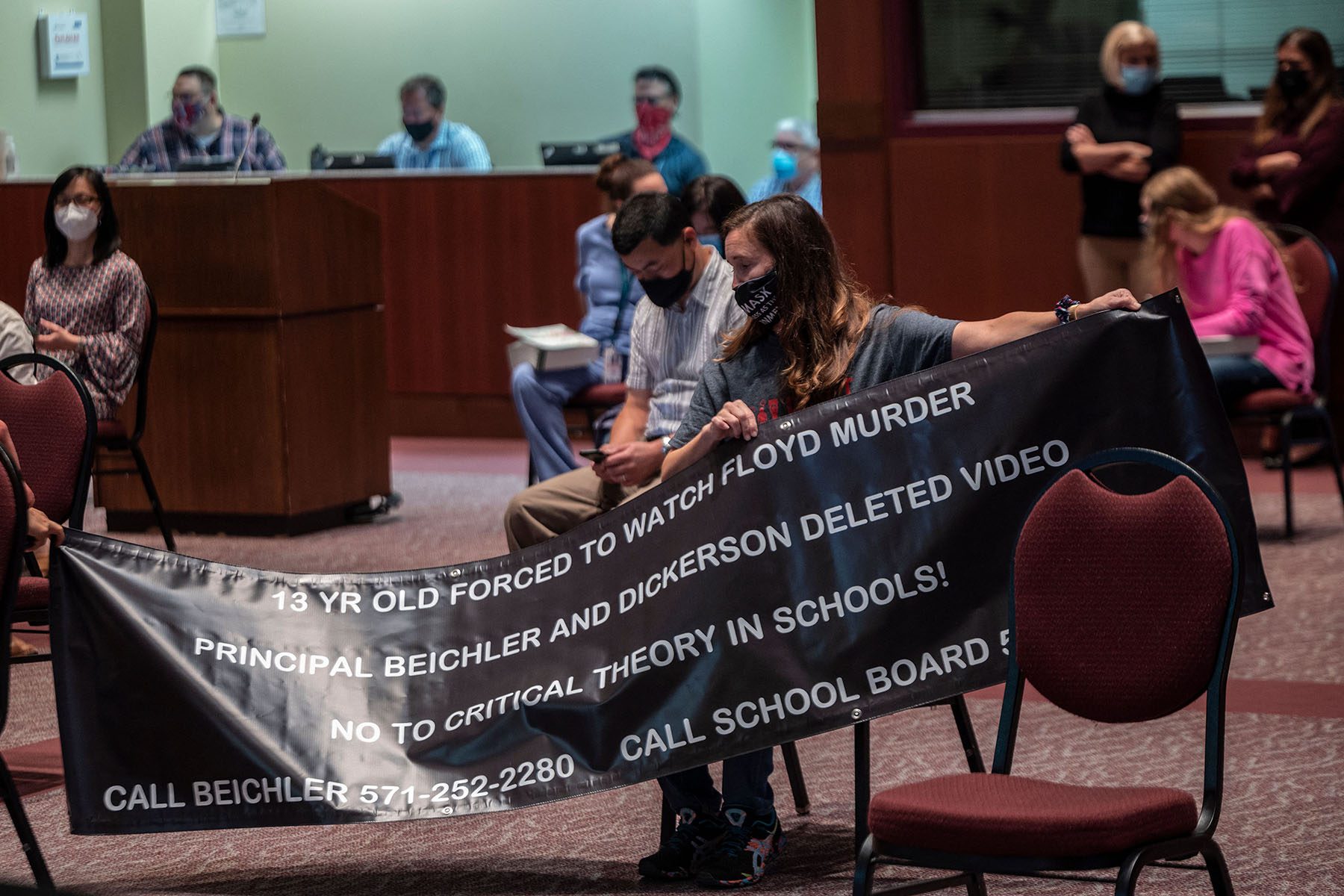An Indiana bill sought to stop schools from teaching divisive concepts, create parental curriculum committees and permit families to sue if their children were exposed to banned lessons.
It made it through the state House at the start of the year. But then Republican supporters objected to tweaks, saying they watered down the “divisive concepts” bill, and last month joined with Democrats to deprive it of the votes it needed in the state Senate.
In a state with a Republican supermajority, it was a stunning defeat — one that Jennifer Smith-Margraf, vice president of the Indiana State Teachers Association, attributes to community members mobilizing against it.
“Parent organizations and community organizations from across the state came together and spoke out forcefully against this bill,” said Smith-Margraf, a Spanish teacher and instructional coach at Oakland Academy in Lafayette, Indiana. “It was presented as representing parents, but it’s clear from our interactions with parents and the parent organizations that joined us that that was simply not the case. They want to see honesty in education and want us to be able to teach what we’ve been teaching in our curriculum according to the standards.”
Similar “parental rights” and “curriculum transparency” legislation has died or stalled in at least eight states, including Indiana, often in the face of opposition by teachers. In Utah, a legislator in January pulled a bill requiring teachers to post lesson plans and learning materials each day for parental review. In Pennsylvania, Gov. Tom Wolf, a Democrat, vetoed a nearly identical bill, and, in Colorado, Democrats voted down a curriculum transparency bill in early March. Wyoming and South Dakota have also killed such bills, while an Iowa bill that would’ve allowed parents to sue if teachers exposed their children to “obscene” materials died as well. In neighboring Illinois, curriculum transparency legislation has stalled.
Educators are still pushing back against more of these bills, which have been pre-filed or introduced in about 35 states over the past year. Teachers and their unions say the legislation would place an undue burden on educators who are overextended during the coronavirus pandemic. Parents already have ample opportunity to weigh in on learning materials and review classwork, they say, with the chance to provide feedback when school boards vote to adopt curricula or see their children’s assignments via the learning management systems that have become staples in public schools. Teachers see the wave of parents’ rights bills in state legislatures as a ploy to drive a wedge between educators and parents. Moreover, as schools grapple with the pandemic and a personnel shortage, educators point out, the bills create a hostile climate for teachers that could drive them out of the workforce.
“One of our major concerns is that we were going to see an increase in the teacher shortage because of this,” Smith-Margraf said. “We had many, many people telling us that they were going to leave education if this passed. There are thousands upon thousands of jobs available at this particular moment, and all sorts of industries that our people are very well qualified for because they’re very well educated. And so we were very concerned about seeing a mass exodus because of this.”
In Utah, educators have also raised the concern that “curriculum transparency” bills could worsen a teacher shortage. Although the Utah legislature last year passed resolutions prohibiting the teaching of critical race theory in schools, the state has yet to pass a bill that would give parents significant new influence over the curriculum.
“The onslaught that’s happening in some other states hasn’t happened in the same way here,” said Sara Jones, the Utah Education Association’s government relations and professional programs director. “I don’t want to say that there hasn’t been an issue that educators are concerned about here, but we haven’t necessarily had the same outcomes.”
The Utah Education Association did object to a school curriculum transparency bill that would have required public school teachers to post instructional materials online every day for parents to review. After a public backlash from educators and their supporters, HB234’s sponsor, Rep. Jordan Teuscher, withdrew the bill. He blamed what he called a “coordinated misinformation campaign” against the bill and insufficient time in the legislative session to get it passed.
But this month a Utah bill focused on “sensitive materials in schools” passed with the support of parental rights groups such as Utah Parents United. That bill “requires a local education agency to include parents who are reflective of a school’s community when determining whether an instructional material is sensitive material.” The legislation’s most controversial aspects, including a provision that could have allowed parents to pocket $10,000 per complaint about the use of “sensitive materials” in the curriculum, were excluded from the final version of the law.
“We still oppose the final version, but it doesn’t go nearly as far as the original version did,” Jones said. The legislation bans pornographic material in schools, which was already prohibited, and will track complaints lodged against schools and how schools resolve them.
“So, who knows what might come next year once this data is presented to the legislature, but it doesn’t create a new parental ability to challenge [learning materials] in court,” Jones said.
Tiffany Justice, co-founder of Moms for Liberty, which supports curriculum oversight bills, said that the weakening of legislation like Utah’s HB 234 stems from lawmakers compromising away parental rights in education. She said that parental rights bills make it clear that the boundary between home and school should be respected and that families should be part of all discussions regarding the mental and physical health of their children.
“When you see a lot of compromises or changes being made to this legislation, I think it’s being overcomplicated in many ways,” Justice said. “I think there’s been an effort to do so much at once regarding curriculum transparency that the parental rights legislation really does need to stay and begin at a very fundamental level, which is that the state recognizes that the parents have the fundamental right to direct the upbringing of their children, and everything else must go through that lens.”
Although groups that back these curriculum bills have been dealt blows in several states, they have succeeded in others. Justice points to Florida’s HB 1557, widely known as the “Don’t Say Gay” bill, which Republican Gov. Ron DeSantis is expected to sign soon. The legislation prohibits school personnel or third parties from teaching lessons on sexual orientation or gender identity to children in grades K-3 or in a way that would not be developmentally appropriate for students. The bill will also affect how mental health services are provided to Florida youth and how much influence parents have over the conversations between their minor children and mental health counselors. Florida’s previous school counseling standards affirmed gender and sexual diversity.
Last year, Florida also passed a “Parents’ Bill of Rights” law that prohibits government entities or other institutions from infringing “upon the fundamental rights of a parent to direct the upbringing, education, health care and mental health of a minor child” without justifiable cause. The bill states that parents have the right to be informed about their children’s educational programs and requires school districts to promote parental involvement by providing families access to children’s classwork and instructional materials. It also recognizes a parent’s right to withdraw a child from portions of the school’s curriculum.
“Every state needs to have a parental rights legislation that recognizes the parent has the fundamental right to direct the upbringing of their children,” Justice said. “That includes the education, the medical care, the moral, religious, character training — all of those things that come from the parent. We need to work to redefine what the school should be doing in that child’s life, and then we need to stick to it.”
Paige Duggins-Clay, chief legal analyst for the Intercultural Development Research Association, an independent education nonprofit in San Antonio, Texas, said parental rights bills are misleading because they suggest families don’t already have a say in their children’s education when they can take part in school board meetings or approach teachers and administrators about any concerns. In Texas, Republican Gov. Greg Abbott kicked off the year by announcing his parental bill of rights proposal to “amend the Texas Constitution to make clear that parents are the primary decision-makers in all matters involving their children.”
Like Utah’s “sensitive materials” bill, the proposal references obscene content in schools, stating that teachers who show students such materials would “lose their educational credentials and state licensing, forfeit their retirement benefits and be placed on a ‘do not hire list.” Abbott’s plan would also allow parents to review curricula online, ensure their concerns about learning materials are heard, and give them the option to determine if their children should repeat a grade instead of leaving that decision to school personnel alone.
“The reality is parents already have really robust rights, whether they’re in the constitution, state law or federal law,” Duggins-Clay said. “So what this does is create this really harmful relationship, or try to generate a really harmful relationship, between parents and the community and schools.”
In 1995, Texas enacted similar legislation outlining parental rights in education. It states that parents have the right to access students’ attendance, academic, disciplinary and health records as well as to participate in school board meetings and review curricular materials. Given this, Duggins-Clay said, the new legislation is duplicative and unnecessary. She suspects some lawmakers are introducing such policies because they want to defund public education and eventually privatize it.
“For many folks, creating that divisive rhetoric and partnering it with this concept of rights and choice is one way that we’re seeing folks who are unfriendly or adversarial to public education promote privatization policies,” Duggins-Clay said. “It’s important to see that for what it is and for folks to recognize that that’s not a productive thing for anybody. We know that the way that we can solve issues around mental health and the pandemic and talking about difficult issues in the classroom is not by creating even more rancor in our discourse; it’s by bringing people together.”
Texas parents are largely happy with public schools, she said, citing a new poll from the Charles Butt Foundation, which works toward educational equity in Texas. The poll found that 68 percent of Texas parents give their local public schools a grade A or B, while just 48 percent of non-parents do. The poll also found that approval ratings for local public schools have risen during the pandemic.
In Georgia, though, many parents have been swayed by the divisive political rhetoric they’ve heard about education, said Lisa Morgan, president of the Georgia Association of Educators. There, parental rights bills made their way through the state legislature earlier this month. Morgan testified against the legislation, calling it an attack on public educators. Echoing Duggins-Clay, she said that these laws aren’t needed, as parents may already provide feedback about instructional materials before their local school boards. Instruction is based on standards set by the state, with community input, she said.

Morgan said some lawmakers have been motivated to pass these bills after seeing how Virginia Gov. Glenn Youngkin ran a successful campaign last fall that focused on provocative reading materials and parents’ rights in schools. Rather than help public education, Morgan said, these bills harm it.
“They are intended to drive a wedge between parents and educators,” she said. “These bills turn what should be that partnership, and what has always been a partnership, into an adversarial relationship.”
Earlier this month, Georgia lawmakers passed legislation limiting the teaching of divisive concepts in schools. Under the law, parents and other stakeholders can submit formal complaints to school administrators about offensive learning materials.
Morgan said the curriculum is not divisive — it’s the legislation.
“Your divisive content — it’s right here,” she said.







